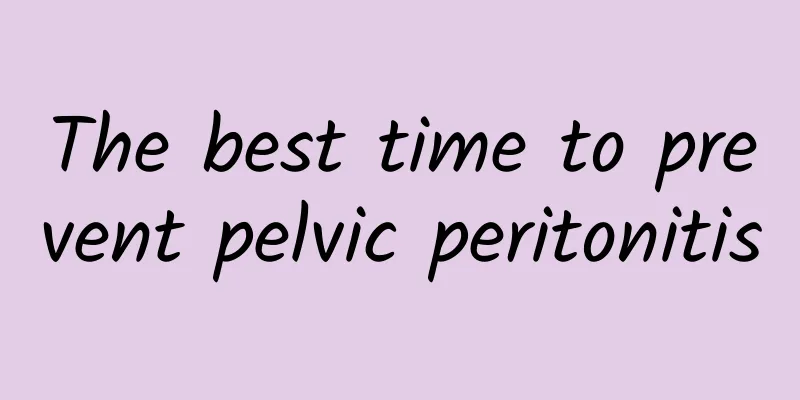The best time to prevent pelvic peritonitis

|
Pelvic peritonitis is a gynecological disease that female friends are more likely to suffer from, especially female friends of childbearing age. In the process of clinical treatment, it is found that the cause of this disease is very complicated, which brings certain difficulties to the treatment. Therefore, in life, female friends need to focus on prevention to reduce the occurrence of pelvic peritonitis. Let us introduce some specific methods below. 1. Fever patients usually sweat a lot when the fever subsides. They should pay attention to keeping warm and keeping the body dry. Change clothes when sweating and avoid using air conditioning or direct convection wind. 2. Eliminate all routes of infection, keep the perineum clean and dry, wash the vulva with clean water every night, and use a dedicated basin for each person. Do not use your hands to wash the vagina, and do not use hot water or soap to wash the vulva. In pelvic peritonitis, there is a lot of leucorrhea, which is thick, so change underwear frequently and do not wear tight or synthetic underwear. 3. Patients with acute or subacute pelvic peritonitis should maintain smooth bowel movements and observe the characteristics of their stools. If pus is seen in the stool or there is a feeling of urgency and heaviness in the abdomen, they should go to the hospital immediately to prevent the pelvic abscess from rupturing the intestinal wall and causing acute peritonitis. 4. Patients diagnosed with acute or subacute pelvic peritonitis must follow the doctor's advice and actively cooperate with the treatment. Patients should rest in bed or take a semi-recumbent position to facilitate the localization of inflammation and the discharge of secretions. Patients with chronic pelvic peritonitis should not overwork, combine work and rest, and moderate sexual intercourse to avoid worsening symptoms. 5. Pay attention to the amount, quality, color and taste of leucorrhea. If the amount of leucorrhea is large, the color is yellow and thick, and it has a foul smell, it means that the condition is serious. If the leucorrhea changes from yellow to white (or light yellow), the amount changes from large to small, and the taste tends to be normal (slightly sour), it means that the condition has improved. 6. Do a good job of contraception, try to reduce the trauma of artificial abortion, and strictly follow aseptic operation to avoid the invasion of pathogenic bacteria. 7. If there is vaginal bleeding during menstruation, after abortion, and after gynecological surgery such as insertion or removal of an IUD, you must refrain from sexual intercourse, swimming, taking a tub bath, or a sauna. You must change sanitary napkins frequently. This will reduce the body's resistance and make it easy for pathogens to enter the body, causing infection. |
<<: What are some ways to prevent pelvic peritonitis?
>>: How to prevent pelvic peritonitis
Recommend
What causes early miscarriage?
The causes of early miscarriage may involve genet...
5 tips to prevent weight gain after a big meal
There are various gatherings and social events. Y...
When is the best time for medical abortion for women? What are the precautions for medical abortion for women?
We all know that the incidence of diseases is inc...
What causes uterine fibroids and how to treat them
Uterine fibroids are a common gynecological disea...
Can Traditional Chinese Medicine Cure Cervical Precancerous Lesions?
Can Chinese medicine cure cervical precancerous l...
How to care for lichen sclerosus vulvar leukoplakia?
Lichen sclerosus vulvar leukoplakia is also a typ...
Four more serious complications of irregular menstruation
Irregular menstruation is a very common gynecolog...
What are the symptoms of miscarriage?
Abortion is a topic that many women do not want t...
What medicine is better for irregular menstruation? 4 symptoms of irregular menstruation
The medication for irregular menstruation should ...
Exercise to stretch your legs in 3 easy steps
You can exercise your leg muscles by simply placi...
What does blood stasis amenorrhea mean?
Blood stasis amenorrhea refers to a condition in ...
What are the main symptoms of Trichomonas vaginitis?
The main symptoms of Trichomonas vaginitis includ...
Common symptoms of cervical hypertrophy include increased vaginal discharge
The emergence of cervical hypertrophy has harmed ...
What is the physical therapy for pelvic inflammatory disease?
What are the physical treatment methods for pelvi...
Hsu Chi's 10 secrets to maintaining her figure! Is it okay to eat whole grain porridge for dinner? Famous weight loss doctor reveals: 4 benefits of whole grains
The internationally renowned actress Shu Qi, alth...









